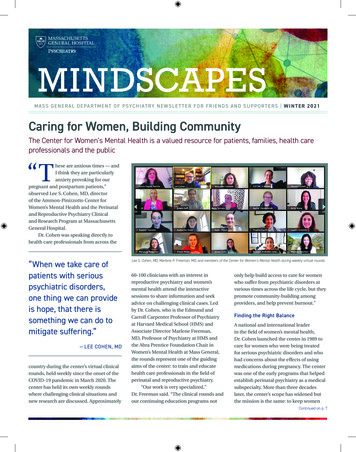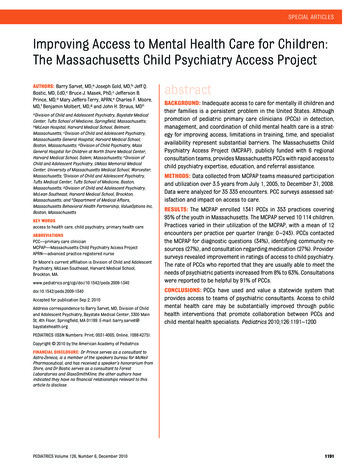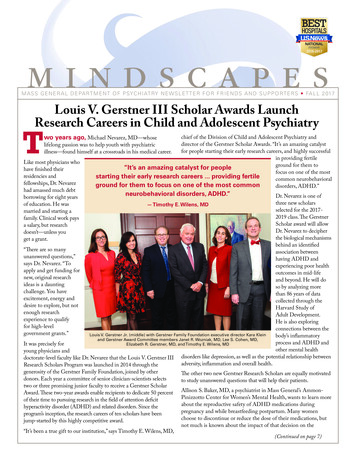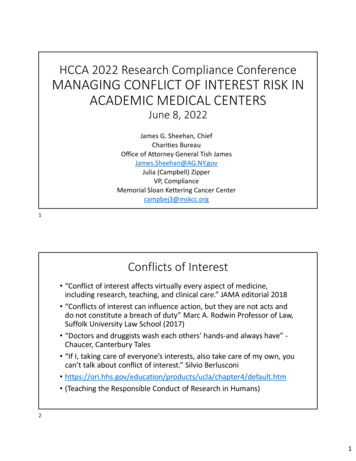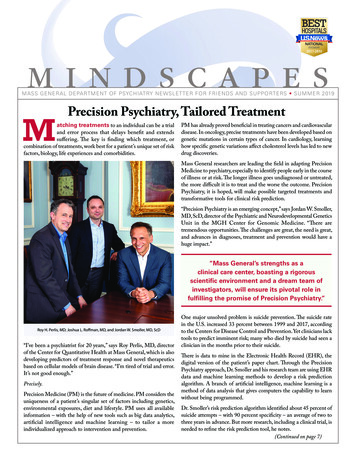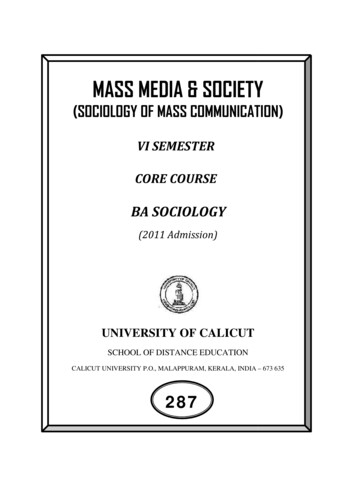
Transcription
Seminar on Grant WritingRandy Gollub, MD PhDMass General Hospital (Psychiatry)Harvard Medical SchoolPresented at Why N How, 11/10/2009
Why are grant applications important? Success in research is measured by thenumber and quality of publications However, grants are necessary to get anacademic position and fund the researchthat produces those publications In order to get a grant funded, a wellplanned and edited grant application iskey
Types of Grants There are many foundation grants. A detailedguide on these are available in the HMS RedBook http://www.hms.harvard.edu/FoundationFunds http://www.hms.harvard.edu/spa Partners/MGH/Harvard institutional grants (eg.Harvard Catalyst Pilot Funding) NIH Grants These are the trickiest but also the most broadlyapplicable
NIH Grants Within the NIH there are 27 institutes and centers:http://www.nih.gov/icd/. Funding for a particular grantcomes from one of these centers The NIH classifies grants by activity code. A list ofthese is available athttp://grants.nih.gov/grants/funding/ac search /funding program.htmEach activity code comes with different requirementsand restrictions. You can see currently funded grants through the NIHReporter: http://projectreporter.nih.gov/reporter.cfm
Big Changes at NIH http://enhancing-peer-review.nih.gov/Shortened applicationsFaster turnaround timeCompletely changed scoring
Summary of Select Activity Codes F32: NIH Training Grant Pays only post-doc salary (does not cover research costs) These are judged based on the merit of the post-doc applying and the qualityof the mentor’s data T32: An award given to an institution to fund postdoctoral research. Postdocs would apply for these through their institution not through the NIHK awards support the transition to an independent investigator Different K awards are for different types of people. Some are for MDs, othersfor PhDs. Some are for clinical research and others for basic science. Eachtype of K award has its own rules. K awards judge the “man” (the potential of the person applying to be a goodscientist), the “plan” (for research and education conducted during the grantperiod), and the “fan” (the mentor(s)) Most K awards require that you be a US citizen or hold a faculty-track position K99: The only K award available to non-US citizen post-docs R21 vs R01: Depends on the project and the outlook of the reviewcommittee R21: 2 years of funding, for smaller exploratory projects, require less moneythan R01s, require less preliminary data, must hold feasibility R01: Major projects, must have a high chance of success
How to write a successful grant:Step 1: The Idea Competition for grants is extremely high. No sloppiness in grant preparation will betolerated by the Review Committee. Only write fundable grants A good grant addresses a previously unanswered scientific questionquestion or seeks to resolvecontroversies in the known body of knowledgeMake sure to come up with specific aims, as well as feasible methodsmethods and a reasonablehypothesis for each aim.Proofread and editThe climate of research changes fastDiscuss the project with mentors in order to see if it is fundablefundableWithin the NIH as a whole and even within each NIH institute therethere are often severalareas of research that receive priority. Your grant has a greatergreater chance of receivingfunding if it matches the goals of the funding agencyMake sure that there are no restrictions prohibiting your grant. For example, during theBush administration, stem cell research could not be fundedGrants are not contracts. Your research plan can be modified over time.Sometimes, a new discovery will invalidate your research methods, in which caseyou may have to come up with a new plan. As long as the hypothesis and methodsare good, the NIH will likely allow modifications in your plan.
RFAs vs PAs vs UnsolicitedAnnouncements An RFA (request for application) is a “sale on grants.” These areissues the NIH particularly wants to address. The score thresholdneeded to receive funding for RFAs may be lower for theseapplications http://grants.nih.gov/grants/guide/search results.htm?year active&scope rfa A PA (Program Announcement) identifies areas of increasedpriority and/or emphasis on particular funding mechanisms for aspecific area of science http://grants.nih.gov/grants/guide/search results.htm?year active&scope pa A Parent Announcement encompasses applications that do not fitinto either of the above categories http://grants.nih.gov/grants/guide/description.htm
Know the Rules Always read the rules Once you have selected an award mechanism, readthe RFA or PA thoroughly. Each announcement contains mostly generalinformation, but unique and important information isspread throughout the announcement Each announcement includes eligibility information,important dates, how long the funding period is, andbudget requirements Here is a sample RFA a-files/RFA-AG-10-010.html
NIH Institutes Each institute has different people on staff and differentinternal politics It’s a good idea to get to know the institute, its politics and itspeople. Get the people there to know you too. In your letter of intent/cover letter, you should directyour grant to 1-2 specific institutes for funding. This benefits the both you and the NIH. The NIH staff does notneed to figure out where to send your grant and you are morelikely to have your grant sent to the right places Each institute has its own budget for funding grants
SROs and POs SRO Scientific Review Officer: An SRO is the person who manages your grantapplication through the review BestPractices/Role of the SRA.htmPO Program Officer: A PO manages funded check po.htmBefore submitting a grant application, you can address questions to the POs andSROs. Since the NIH wants to encourage grant application submissions, they will often tell you tosubmit an grant application for your idea. Questions about whetherwhether or not a project isfundable and worth submitting are best left to your mentors.SROs and POs will likely be helpful in determining if a project is applicableapplicable for theirfunding agency. You should ask them questions like “Is my project applicable to your NIHinstitute?”institute?” and “What study section is the best for my grant application?”application?”You can contact several different POs and SROs within an institute and amongst severalinstitutes while searching for advice. Some people will be more helpful than others.However, the staff at NIH is small and there are a limited numbernumber of people to speak withIt is the job of SROs and POs to help you. Feel free to contact them about most questionsquestionsyou may have.Also, many SROs and POs are helpful and want you to succeed. You can develop a longlasting working relationship with these people. For this reason, it is best to be friendly andnice when speaking with the SROs and POs.When you have chosen a RFA or PA, check the funding announcement to get a listof contactsNIH institutes will often set up booths at many national meetings as well as holdgrant-writing workshops
Review Process – Study Sections Once submitted to NIH, grants are assigned to a study section There are different types of study sections – standing, and specialemphasis. Each study section has its own composition anddomain of knowledge For certain topics, it may be advisable to request a particular studysection if it possesses expertise that other sections do not have Rosters for the study sections are available online athttp://era.nih.gov/roster/ If a study section does not contain members possessing expertisepertinent to your grant application, you may request an additionalreviewer (and submit recommendations for who to invite) byworking with the SRO
Dates and Deadlines Check the grant announcement forspecifics regarding dates and deadlines hedule.htm Partners does an internal review of allNIH grants before submitting it to theNIH:http://phsresearchintranet.partners.org/PHS ResearchMgmt/RM Prepare rtners.org/PHS ResearchMgmt/RM Prepare Proposal.asp#Deadline
Grant Applications and Forms Download the grant application directlyfrom the NIH page with the fundingannouncement Partners also has a list of forms for use:http://phsresearchintranet.partners.org/PHS ResearchMgmt/RM Forms.asp Always download new forms for eachgrant submission as forms change fast
Letter of Intent/Cover Letter Some PAs and RFAs request a letter of intent while others do not Information to include in a formal letter of intent or cover letter: Funding announcement you are replying to Institutes you would like to send your application to Review panels you think would be most appropriate for your project The NIH welcomes receiving suggestions regarding the instituteand study panel to send your grant application to. It reduces theamount of time the staff has to spend deciding these things. Sending your grant to the right place can also increase yoursuccess in the review process. You may consider calling ahead to the SRO to let them know youare submitting a grant application
Budget Writing Check the rules of the grant announcement to findbudget restrictions. This includes the budget limits andwhether a modular budget is allowed Use the budget template available on the PartnersResearch Management website. It will automaticallycalculate some fields for you Request the appropriate amount of money to conductyour research properly and honestly. This includes aconsideration of cohort size, outcome measures, andpower. http://grants.nih.gov/grants/developing budget.htm
Modular Budget vs Detailed Budget A modular budget does not have a line-item account of the budget. Adetailed budget does. Detailed budgets are time consuming to make To use a Modular budget, the grant must meet the following criteria 250,000/year direct costs ar.htm Even if you apply for a modular budget, you should have already plannedout how much money you will need Having a budget planned out is essential to conduct honest research A full budget is required for Just-In-Time (JIT) submissions, which arerequested if your project received a good score at review and is likely to befunded. Remember to inquire about Departmental fees and other fees (MartinosCenter IT Support) and include this in your grant. For some categories (ex office supplies) it is fine to put a rough estimate of theamount of money you need on the application
Salaries and Percent Effort Salary ranges are dependent on official title and years ofexperience Discuss your salary with your mentor Raises can be requested at the departmental level upon success withgrant submissions Special permission is required for raises 6% Mary Clark (MMCLARK@PARTNERS.ORG / 617-724-3087 )provides consultation on professional staff compensation at Partners Maximum Percent Effort allowed is 100% / 12 Calendar Months In the “overlap” section of your Other Support page, it should explainhow percent effort will be changed to maintain no more than 100%. Each grant can only have your percent effort lowered by 25% orspecial approval is needed Work with your grant administrator to adjust your support
Indirect Costs Remember to consider indirects in yourbudget Partners charges indirects on all grants Indirects are used to fund many institutionalresources Each institution negotiates an indirect ratewith the NIH
What can Partners do to help? You can contact the Partners grants teamabout any grants related questions and gettraining on grant submission Partners conducts an institutional review of allgrant applications About 15 days prior to the NIH deadline for thegrant, it must be sent to your Partners grantadministrator for proofreading http://egrantsubmission.partners.org/ Your mentors and peers are also a valuableresource
Review Process Check out the video of a mock reviewsession: ewProcess.htm SROs and POs sit in on the reviewprocess. They can help clarify some ofthe issues raised by the review panel
What if I don’t get funded? Resubmissions It is common for grants to require 1-2resubmissions before getting funded There are regulations on the number oftimes a grant can be resubmitted. This willbe explained in the grant announcement
Useful Resources/Websites htm .htm#n01 p://grants.nih.gov/grants/grant basics.htmhttp://grants.nih.gov/grants/grants tp://grants.nih.gov/grants/peer review process.htmYour peers and mentorsOnline blogs
Mass General Hospital (Psychiatry) Harvard Medical School Presented at Why N How, 11/10/2009. Why are grant applications important? Success in research is measured by the number and quality of publications However, grants are necessary to get an academic position and fund the research
